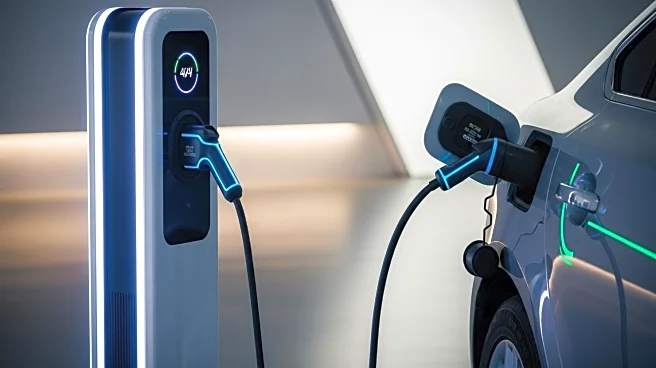What is the story about?
What's Happening?
The North American Charging Standard (NACS), developed by Tesla, has become available for non-Tesla electric vehicles (EVs), significantly improving charging options for these vehicles. The NACS requires an adapter for most non-Tesla EVs, allowing them to access Tesla's Supercharger network, which was previously exclusive to Tesla vehicles. This development comes amid a substantial buildout of charging stations, enhancing the feasibility of long-distance travel for non-Tesla EV owners. The NACS adapter has been tested successfully during road trips across northern New England, demonstrating its potential to reduce charging times and increase convenience for EV drivers. The adapter allows non-Tesla vehicles to charge at V3 250kW or V4 chargers, providing faster charging capabilities compared to traditional Level 2 chargers.
Why It's Important?
The introduction of the NACS adapter is a significant advancement for the EV industry, particularly for non-Tesla vehicle owners. It addresses one of the major challenges faced by EV drivers: the availability and speed of charging stations. By enabling access to Tesla's extensive Supercharger network, the NACS adapter can potentially reduce range anxiety and make EVs more appealing to consumers. This could lead to increased adoption of electric vehicles, contributing to the reduction of carbon emissions and supporting environmental sustainability goals. Additionally, the improved charging infrastructure may encourage more manufacturers to adopt the NACS standard, fostering greater interoperability and collaboration within the industry.
What's Next?
As the NACS adapter becomes more widely adopted, it is expected that more non-Tesla EVs will be able to utilize Tesla's Supercharger network, further enhancing the convenience and efficiency of electric vehicle travel. This could lead to increased demand for NACS-compatible charging stations and potentially influence other charging networks to adopt similar standards. The success of the NACS adapter may also prompt Tesla to expand its Supercharger network, accommodating a broader range of EVs and supporting the growth of the electric vehicle market. Stakeholders, including EV manufacturers and charging infrastructure providers, may need to consider strategic partnerships and investments to capitalize on this development.
Beyond the Headlines
The availability of the NACS adapter raises questions about the future of charging standards and the potential for a unified charging system across different EV brands. This could lead to discussions about regulatory frameworks and industry standards to ensure compatibility and fairness in the charging infrastructure. Additionally, the increased accessibility to fast charging may influence consumer behavior, encouraging more people to switch to electric vehicles and potentially impacting the automotive market dynamics.















